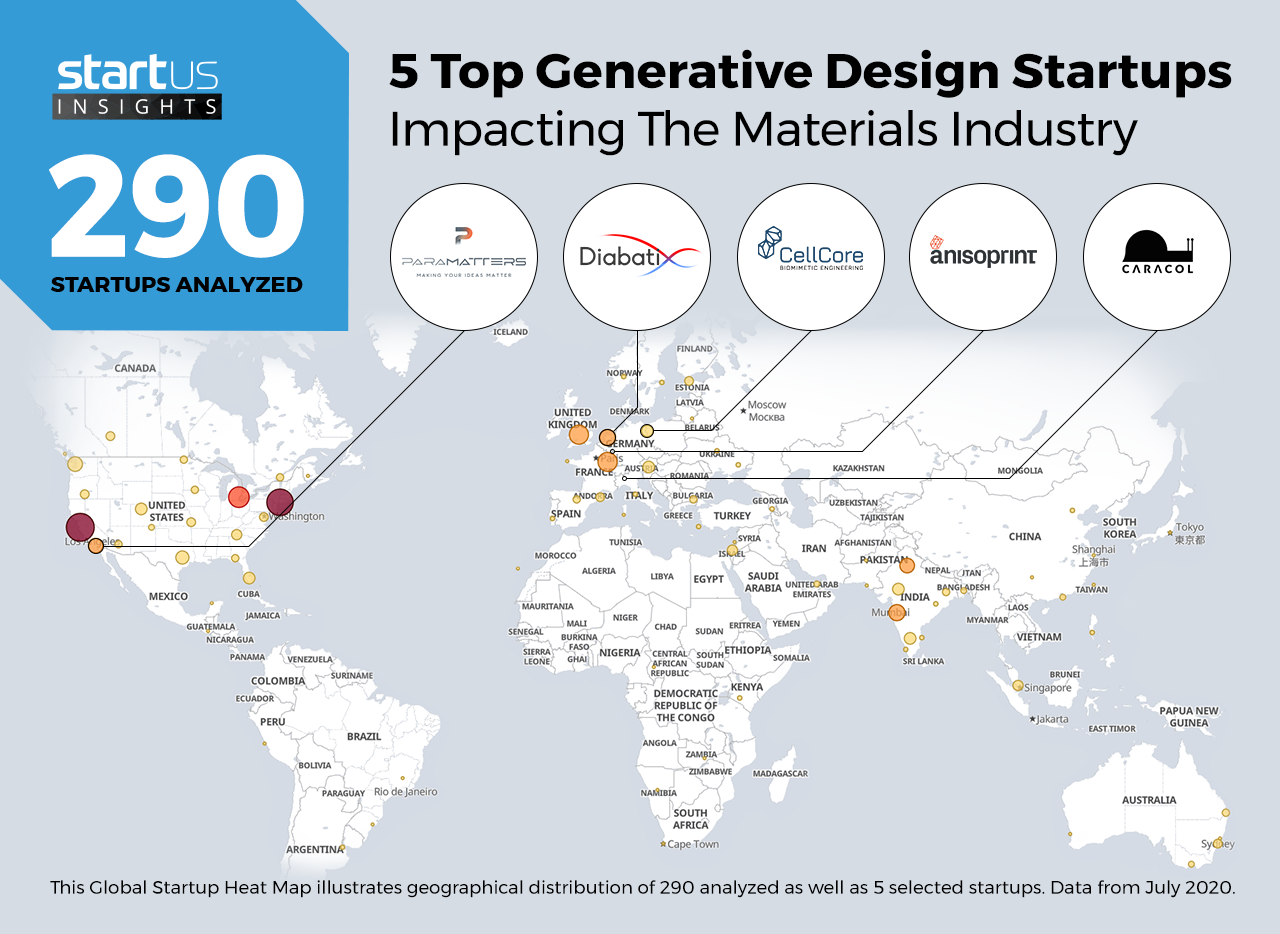Our Innovation Analysts recently looked into emerging technologies and up-and-coming startups working on solutions for the materials sector. As there is a large number of startups working on a wide variety of solutions, we decided to share our insights with you. This time, we are taking a look at 5 promising generative design startups.
Heat Map: 5 Top Generative Design Startups
Using our StartUs Insights Platform, covering 1.116.000+ startups & emerging companies, we looked at innovation in the field of materials. For this research, we identified 290 relevant solutions and picked 5 to showcase below. These companies were chosen based on a data-driven startup scouting approach, taking into account factors such as location, founding year, and technology among others. Depending on your specific criteria, the top picks might look entirely different.
The Global Startup Heat Map below highlights 5 startups & emerging companies developing innovative generative design solutions. Moreover, the Heat Map reveals regions that observe a high startup activity and illustrates the geographic distribution of all 290 companies we analyzed for this specific topic.
ParaMatters – Multi-Material Topology Optimization
Often, the strongest material for a particular function is either heavy or expensive. As a workaround, lighter and inexpensive materials supplement these stronger materials to provide similar characteristics. Advanced manufacturing uses multiple materials at once, creating a higher demand for multi-material design solutions. Moreover, topology optimization solutions improve the design of existing materials to enable lightweight applications.
ParaMatters is a US-based startup that develops a cloud-based platform for generative design and advanced manufacturing. CogniCAD employs multi-material topology optimization to deliver significant reductions in weight and manufacturing cost. The platform also offers meso-structural optimal generative design for porous materials.
CellCore – Biomimetic Design
Natural structures, such as bones, are evolved to be very efficient at supporting large loads and have other desirable properties too. Biomimetic designs take inspiration from natural structures. For example, lightweight applications inspired by bird wings. Biomimetics also allows startups to integrate special functions into materials.
German startup CellCore specializes in biomimetic design solutions for technical components. The startup uses evolutionary algorithms to iteratively optimize a design based on specific data and target parameters. This enables generative computer-aided engineering (CAE) workflows that save time and cost. The startup produces lightweight materials for applications in automotive, rail, and space.
Diabatix – Generative Thermal Design
Thermal design considerations are crucial for the manufacturing of a wide range of products. Besides, complex product geometries render general-purpose thermal design solutions inadequate for different products. Generative thermal designs provide an optimal cooling solution for any particular problem. Moreover, these designs minimize pressure loss, thermal resistance, and thermal deformation and maximize power, heat flux, and temperature uniformity.
Diabatix is a Belgian startup that offers a generative thermal design software. The startup uses artificial intelligence (AI) to power a generative process that optimizes the heat sink design for customized applications. Among other thermal solutions, they offer liquid cold plates that are precisely optimized to the customer’s heat source, manufacturing method, material, and dimensions.
Caracol AM – Advanced Additive Manufacturing
Generative designs allow designers to conceptualize parts with complex shapes. However, these shapes are often difficult to produce with traditional manufacturing technologies. Consequently, this creates scope for startups to offer additive manufacturing solutions to bring optimal shapes produced with generative design to reality.
Italian startup Caracol AM uses generative design and additive manufacturing to produce advanced materials for industrial goods. With the help of a proprietary advanced additive manufacturing robotic system, the startup overcomes large scale, complex geometries, and materials limits of traditional 3D printing. The system uses fused deposition modeling (FDM) to build materials, layer-by-layer.
Anisoprint – Composite Printing
Manufacturers regularly combine multiple materials in a single product to achieve structural improvements. However, these designs are usually not amenable to common manufacturing methods. Composite printing, combined with generative design, goes beyond the traditional constraints to produce materials that use fewer resources but are better suited for industrial applications.
Luxembourg-based startup Anisoprint develops generative design solutions for composite printing. The startup offers Aura, a splicer software that prepares a 3D model and generates reinforcing fiber trajectories in each layer. This software allows designers to adjust the reinforcement scheme to obtain strong and lightweight parts allowing them to produce optimal composite structures through continuous fiber 3D printing.
What About The Other 285 Solutions?
While we believe data is key to creating insights it can be easy to be overwhelmed by it. Our ambition is to create a comprehensive overview and provide actionable innovation intelligence so you can achieve your goals faster. The 5 generative design startups showcased above are promising examples out of 290 we analyzed for this article. To identify the most relevant solutions based on your specific criteria, get in touch.









